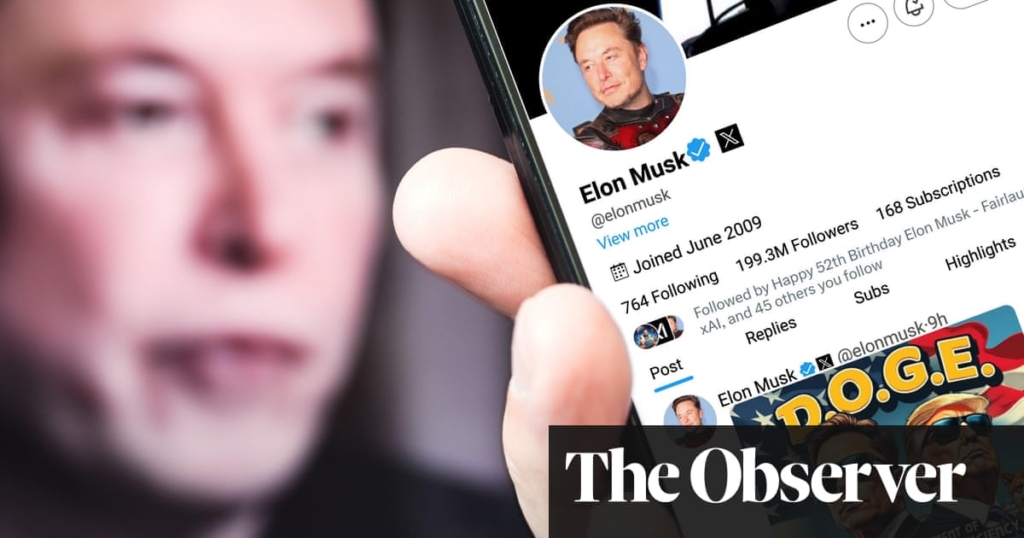Bu içerik, Twitter’ın ölümü olarak nitelendirilen bir haftayı ele alıyor. Platform, bilgi alışverişi için bir pazar yeri olarak kabul edilen eski günlerini geride bırakıp tarihindeki en büyük kaçışı yaşamıştır. Elon Musk’ın sahibi olduğu platform, Trump’ı Beyaz Saray’a taşımak için bir megafon olarak kullandı ve şimdi ABD hükümetinin merkezinde oturuyor. Ancak Musk’ın hareketleri ve platformdaki artan aşırı sağ diye edebiyat, nefret söylemi ve botların yayılması, X kullanıcıları arasında artan rahatsızlığa neden oldu. Bu durum, birçok ünlü ismi platformdan ayrılmaya zorladı. X’in geleceği belirsizliğini korurken, bazı tahminler çöküşten, Trump ve Musk’ın karşı karşıya gelmesi durumunda anti-Trump platformuna dönüşmeye kadar uzanıyor. Yeni sosyal ağlar, kullanıcıların ağlar arasında bağlantı kurmasına olanak tanıyan “ekosistemler” üzerine inşa ediliyor. Sonuç olarak, X’in kaderi belirsizliğini korurken, gelecekte AI’nın sosyal medyayı yutabileceği ve xAI’nin bu alanda önemli bir rol oynayabileceği öngörülüyor.
[ad 1]
Kaynak: www.theguardian.com
Was that the week that marked the death of X? The platform formerly regarded as a utopian market square for exchanging information has suffered its largest exodus to date.
Bluesky, emerging as X’s newest rival, has amassed 16 million users, including 1 million in the course of 24 hours last week. Hundreds of thousands of people have quit the former Twitter since Donald Trump’s election victory on 6 November.
The catalyst is X’s owner, Elon Musk, the world’s richest man, who transformed the social media site and used it as a megaphone to blast Trump into the White House.
The US president-elect said Musk would head the new Department of Government Efficiency, the acronym for which, Doge, is a pun on the dog internet meme and the Dogecoin cryptocurrency, started as a joke by its creators, which jumped in value after Musk dubbed it “the people’s cypto” in 2021.
Musk now sits at the heart of the US government, yet requires no Senate approval for his actions and can continue to work in the private sector. He’s allowed to keep X and his 204 million followers, as well as head his electric car company Tesla and rocket company SpaceX. For the first time in history, a big tech billionaire is now shaping democracy not just indirectly, via his media, but directly.
“I’m not aware of any precedent for this approach,” said Rob Enderle, president of the technology analyst firm Enderle, who has worked with companies including Microsoft, Sony and Dell.
As recently as 2022, Musk tweeted that “for Twitter to deserve public trust, it must be politically neutral, which effectively means upsetting the far right and the far left equally.” He tweeted that “Trump would be 82 at end of his term, which is too old to be chief executive of anything, let alone the United States of America.”
Months later, when Musk bought Twitter for $44bn, he fired content moderators and charged for account verification, which meant people could buy influence. Twitter was rebranded to X, shed millions of users and reinstated Trumps’s account, suspended after the White House insurrection in January 2021.
The proliferation on X of alt-right diatribe, hate speech and bots, as well as Musk’s own clash with the UK government during the riots in August, have led to mounting disquiet among X users. The Guardian and Observer announced last week that their presence on the site was now untenable and they would no longer post. Stephen King, the author, left, saying it had become “too toxic”. Oscar-winners Barbra Streisand and Jamie Lee Curtis have departed the platform.
“X has become effectively Truth Social premium,” said Mark Carrigan, author of Social Media for Academics, referring to Trump’s hard-right social media platform. And the talk in technology circles is that Trump’s Truth Social could be folded into X.
If that happens, whose interests take priority? Would Musk suppress criticism of the authoritarian governments he does business with, or promote it? In the Donald and Elon media show, who is the puppet or paymaster?
“If that happens, it will be the ultimate amplification machine for Trump’s ideas – a political super-app masquerading as social media,” said James Kirkham of Iconic, which advises brands including Uber and EA Sports on digital strategies. “Forget Facebook or Fox News; the true heart of the GOP’s digital strategy could be X.”
“I’m expecting X and Truth Social to merge,” said Enderle. “But this could be one of the efforts that will come between Musk and Trump, given how overvalued Truth Social now is.”
The bromance between the world’s two biggest egos is mutually beneficial only as long as the two transactional, power-hungry and impulsive men play nice. Trump is hawkish on China, one of Tesla’s most lucrative markets. Trump essentially campaigned against electric car manufacturing. Trump is protectionist; Musk opposes tariffs. On climate change, they are opposed.
Jonathan Monten, a political science professor at UCL, is sceptical over the durability of their relationship.“Musk’s use to Trump was both private money and providing a platform, or using a platform, to a more favourable pro-Trump line,” he said.
“It’s unclear what continued purpose or use Musk actually has to him. Yes, it’s sort of this celebrity story, but that’s Trump’s brand. He has one celebrity story today and tomorrow we’ll have another.”The early 2010s were the halcyon days of Twitter when activists, artists, lawyers, academics, policymakers, journalists and specialists of every flavour could connect, share information, exchange ideas and follow events in real time.
after newsletter promotion
It would be easy to portray Musk as the bogeyman, but some argue that it was TikTok and the advent of the algorithmic timeline that fundamentally destroyed Twitter. As social media began optimising for scale and for profit at the expense of user experience, algorithms prioritised the “best” content – the content that shouted loudest or was most specifically tailored to users. Curated accounts to follow, and “most recent” content, fell by the wayside.
“As much as I think Musk has acted in harmful ways, I think part of this is about the logic of social media platforms as they evolve,” said Carrigan. “The consequences of an advertising-based model incentivise certain ways of organising the platform that create negative effects.”
Bluesky, which became the most popular app on the app store on Friday, is the choice for X refugees, although its 16 million users pale in insignificance compared to Meta’s Threads, which reported reaching 275 million monthly active users, and X with about 317 million..
For some tech nerds, the X-odus is not something to mourn, but could herald the era of decentralised social networks they have been dreaming of known as the “Fediverse”.
Advocates of the “Fediverse” argue that there should be one account for any social media network in the same way that Gmail accounts can email any email addresses, or mobile numbers call users on any other network.
In walling off social networks so users can’t leave, the platform has the power. Instead, newer social networks including Bluesky are being built on “ecosystems” that enable them to interconnect.
No one knows what will happen to X, with predictions ranging from collapse, to flipping to an anti-Trump platform if Musk and the president lock horns, to becoming a training ground for Musk’s xAI venture. AI could gobble up social media, and xAI is valued at $40bn – almost the price Musk paid for Twitter.



Yorumlar kapalı.